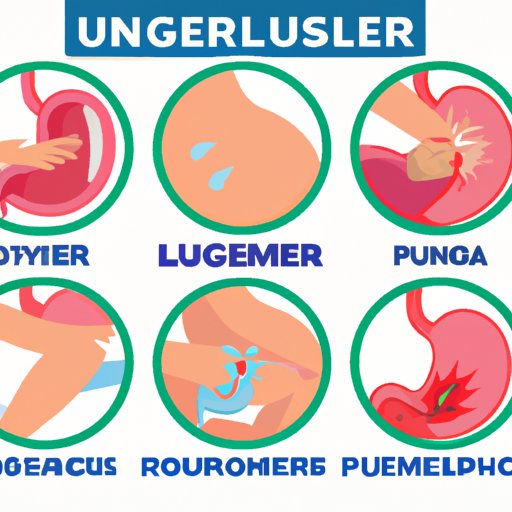
I. Introduction
If you’ve ever experienced abdominal pain or discomfort, you may have wondered if it’s related to an ulcer. Ulcers are a common condition that affect millions of people worldwide every year. It’s important to be aware of the symptoms of an ulcer so you can take action if you suspect you have one. In this article, we’ll explore the key indicators of ulcers and how to know if you have one.
II. Symptoms of Ulcers: A Comprehensive Guide
Ulcers are sores that can occur in the stomach lining or the small intestine. They can cause a variety of symptoms, including:
- Pain or discomfort in the abdomen
- Nausea and vomiting
- Loss of appetite, feeling full quickly
- Bloating and gas
- Heartburn or acid reflux
If you experience any of these symptoms, it’s important to monitor them and seek medical attention if they persist or worsen. It’s also helpful to distinguish between duodenal ulcers (ulcers in the small intestine) and gastric ulcers (ulcers in the stomach). Duodenal ulcers tend to cause pain that subsides after meals, while gastric ulcers tend to cause pain that worsens after meals.
III. Warning Signs You May Have an Ulcer
There are several risk factors that can increase your likelihood of developing an ulcer, including:
- Smoking
- Regular use of nonsteroidal anti-inflammatory drugs (NSAIDs)
- Heavy alcohol consumption
- Having a family history of ulcers
- Having a previous ulcer
If you have any of these risk factors and experience the following symptoms, it’s important to seek medical attention:
- Vomiting blood
- Passing dark, tarry stools
- Sudden, severe stomach pain
- Fainting or feeling lightheaded
If your symptoms persist or worsen, it’s important to seek medical advice as soon as possible. Ulcers can cause significant damage if left untreated.
IV. How to Tell If Your Stomach Pain Is an Ulcer
Ulcer-related pain is typically located in the mid to upper abdomen and can feel like a burning or gnawing sensation. It may be accompanied by bloating, nausea, or vomiting. It’s important to note that not all abdominal pain is related to ulcers, and other digestive problems like irritable bowel syndrome (IBS) or gastroesophageal reflux disease (GERD) can cause similar symptoms.
However, if you experience recurrent, severe abdominal pain that doesn’t improve with over-the-counter remedies or dietary changes, it may be a sign of an ulcer. It’s important to consult with your doctor to rule out other causes and develop a treatment plan if necessary.
V. The Key Indicators of Ulcers: What You Should Look Out For
In addition to the symptoms listed above, there are several key indicators that can suggest the presence of an ulcer, including:
- Feeling full quickly after eating small amounts
- Loss of appetite or unexplained weight loss
- Feeling bloated or gassy after meals
- Having a sour or metallic taste in your mouth
- Experiencing a decrease in energy or fatigue
If you experience any of these symptoms, it’s important to consult with your doctor and explore possible treatment options. Certain lifestyle changes, such as avoiding caffeine and spicy food or reducing stress, can help reduce ulcer symptoms and prevent further damage.
VI. Ulcers 101: Identifying the Symptoms and Seeking Treatment
Diagnosing an ulcer typically involves an endoscopy, which allows your doctor to visualize the stomach lining and take a biopsy for further analysis. Treatment options for ulcers may include antibiotics to eliminate the bacteria H. pylori, acid-reducing medications, or surgery in severe cases.
If you have been diagnosed with an ulcer, it’s important to take steps to manage your symptoms and prevent further damage, such as:
- Avoiding foods and substances that exacerbate symptoms
- Incorporating stress-management techniques into your routine
- Taking medications as prescribed by your doctor
- Maintaining a healthy diet and exercise routine
It’s also important to acknowledge the impact that ulcers can have on your mental health and overall well-being. Coping with chronic symptoms can be challenging, and seeking support from friends, family, or a mental health professional can be helpful in managing your emotional response to your condition.
VII. Conclusion
Knowing the symptoms of an ulcer and seeking medical attention if you suspect you have one is essential in preventing further damage and managing chronic symptoms. While ulcers can be a serious condition, adopting healthy lifestyle practices and seeking appropriate treatment can help you take control of your health and reduce your symptoms.
Remember to listen to your body and prioritize good health practices whenever possible. Your health is important, and seeking medical attention when you need it is a vital part of maintaining your overall well-being.





